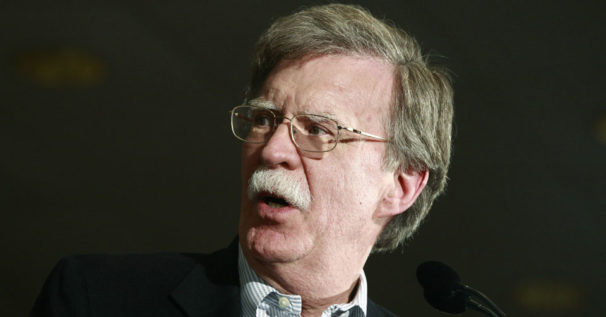
WASHINGTON—President Trump is sending an aircraft carrier and bomber planes, in addition to other military equipment, to waterways and land areas near Iran in what could be a prelude to an attack on that country—an attack which could trigger a wider war.
When questioned by the press, the administration would not cite any specific threat to the U.S. by Iran.
The war hawk national security adviser, John Bolton, declared last night that the Trump administration is dispatching the Abraham Lincoln Carrier Strike Group and an entire task force of bombers to areas close to Iran. Fresh off several weeks of threatening the elected government of Venezuela by encouraging a coup in that country, Bolton refused to give specifics as to why the U.S. is now raising military tensions in the Middle East. All he would say in his announcement from the White House was that there are “a number of troubling and escalatory indications and warnings.” What they are and from where they come he would not say.
Bolton is known for his outrageous provocations against countries all over the world. In addition to encouraging the coup in Venezuela, he unabashedly came out in support of stealing that country’s national resources by suggesting that control of Venezuelan oil by private American companies was preferable to the public control under which they currently operate, with profits going to support public programs in Venezuela.
The Pentagon, of course, had to approve the latest deployments threatening Iran, but it is also remaining silent about why it has done so.
The aircraft carrier Lincoln, if it is to be used to threaten Iran, is already in the Mediterranean Sea. Although the administration would not say for sure, it is believed that it could easily be moved into the Red Sea and sail from there to the Persian Gulf. At the moment, the United States has no carriers in the Persian Gulf. Deploying one there—one capable of sending missiles and bombers into Iran and elsewhere in the Middle East—represents a major and dangerous new escalation in the attacks on that country.
One such earlier attack came when Trump canceled the nuclear disarmament deal hammered out with Iran during the Obama administration. Trump claimed his administration did so because Iran violated terms of the deal. U.S. allies, with the exception of Israel, deny that Iran has reneged on the deal. They oppose U.S. sanctions levied against that country and the pressure the U.S. puts on them to observe those sanctions.
Although Bolton was short on specifics, he was long on bombastic threats last night. He said the U.S. wants to send a message that “unrelenting force” will meet any attack on U.S. interests or those of its allies. “We are fully prepared to respond to any attack, whether by proxy, the Islamic Revolutionary Guard Corps, or regular Iranian forces,” he said.
Again without citing any specific evidence of coming attacks upon the U.S., Bolton said that “a bomber task force” is being sent along with the aircraft carrier. Although he would not say, the task force too is likely to be placed close to Iran, possibly in Saudi Arabia.
When questioned today by the press, Secretary of State Mike Pompeo, the tea party lawmaker Trump promoted into his cabinet, said that this new escalation has been planned for “a little while.”
Pompeo seemed to be laying the groundwork for the U.S. to claim that almost any development anywhere in the Middle East that the Trump administration did not like could be justification for an attack on Iran.

“It is absolutely the case that we have seen escalatory actions from the Iranians, and it is equally the case that we will hold the Iranians accountable for attacks on American interests,” Pompeo said. “If these actions take place, if they do by some third-party proxy, a militia group, Hezbollah, we will hold the Iranian leadership directly accountable for that.”
When reporters asked him to clarify, Pompeo said, “I don’t want to talk about what underlays it, but make no mistake, we have good reason to want to communicate clearly about how the Iranians should understand how we will respond to actions they may take.”
Not lost on most domestic and overseas observers is the fact that war-like moves at this time by the Trump administration may make political sense for the embattled president. The more distractions from the troubles Trump faces with congressional investigations and blowback from the Mueller probe, the better for Trump, the president may feel. A big new military conflict may be just what his doctor ordered.
The Trump administration stepped up its attacks on Iran a month ago when it announced it will take action against all countries, not just some of the countries, that purchase oil from Iran. That announcement means the administration is now putting the squeeze on China, India, Japan, and South Korea, in addition to Europe.










